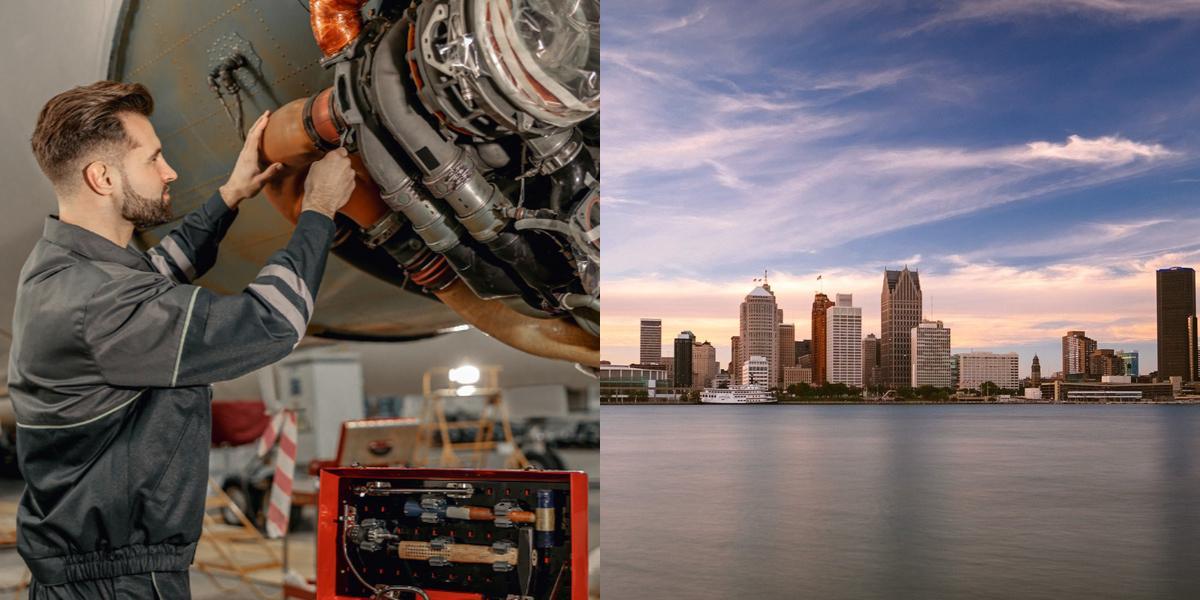How to Become an Aviation Mechanic in Michigan

Aviation mechanics, also known as aircraft maintenance technicians, are responsible for inspecting, repairing, and maintaining aircraft to ensure their safety and functionality. They play a crucial role in the aviation industry by keeping planes in optimal condition for safe and efficient operation.
Step 3: Search for job openings
There are several ways to search for job openings as an Aviation Mechanic. You can check online job boards, such as Indeed or LinkedIn, for postings in your area. You can also reach out to local aviation companies directly to inquire about any open positions. Additionally, consider joining professional associations or unions that may have job boards or resources for members.
Step 4: Prepare for interviews
Once you start getting interviews, it's important to be prepared. Research the company beforehand, familiarize yourself with common interview questions, and practice your responses. Be sure to highlight your relevant skills and experience during the interview and demonstrate your passion for the field.
Step 5: Gain additional certifications or specializations
To stand out from other candidates and increase your job prospects, consider gaining additional certifications or specializations. This can show employers that you're committed to continuous learning and professional development. Some examples of additional certifications include avionics technician certification, inspection authorization, or specialized training in specific aircraft types.
Step 6: Consider an apprenticeship or entry-level position
If you're having trouble finding a job as an Aviation Mechanic right away, consider starting with an apprenticeship or entry-level position. These positions can provide valuable hands-on experience and help you build your skills and network in the industry. They can also lead to more advanced positions as you gain experience and prove your abilities.
Career Paths and Opportunities after Becoming an Aviation Mechanic
Once you've obtained your Aviation Mechanic certification and gained some experience in the field, there are several career paths and opportunities available to you. Here are a few examples:
1. Airline Maintenance Technician
Many Aviation Mechanics go on to work for airlines as maintenance technicians. In this role, you'll be responsible for inspecting, troubleshooting, and repairing aircraft to ensure they are safe and compliant with regulations. Airline maintenance technicians often work in hangars or repair stations and may specialize in specific aircraft types.
2. General Aviation Technician
General aviation technicians work on smaller aircraft, such as private planes or helicopters. They may be employed by private aviation companies, flight schools, or repair facilities. This role often involves a wider range of tasks, as general aviation technicians may be responsible for both airframe and powerplant maintenance.
3. Avionics Technician
Avionics technicians specialize in the electronic systems of aircraft, such as communication, navigation, and flight control systems. They troubleshoot and repair these systems to ensure they are functioning properly. Avionics technicians may work for airlines, repair stations, or avionics shops.
4. Quality Control Inspector
Quality control inspectors are responsible for ensuring that aircraft maintenance and repairs meet industry standards and regulations. They inspect completed work, review maintenance records, and perform audits to ensure compliance. This role requires a strong attention to detail and knowledge of aviation regulations.
5. Aircraft Manufacturing and Assembly
Another career path for Aviation Mechanics is to work in aircraft manufacturing and assembly. In this role, you'll be involved in the construction, installation, and testing of aircraft components. This can be a rewarding career path for those who enjoy working with their hands and being part of the production process.
6. Management and Supervisory Roles
As you gain experience in the field, you may have the opportunity to move into management or supervisory roles. These roles involve overseeing a team of Aviation Mechanics, coordinating maintenance schedules, and ensuring compliance with regulations. Management positions often require strong leadership and organizational skills.
Final Thoughts
Becoming an Aviation Mechanic can be a rewarding career choice for those who have a passion for aviation and enjoy working with their hands. The certification process may require a combination of education, experience, and exams, but the effort is well worth it in the end.
Once you've obtained your certification, there are various career paths and opportunities available to you. Whether you choose to work for an airline, in general aviation, or in a specialized field like avionics, there is no shortage of options.
Remember to continuously update your skills and certifications to stay competitive in the field. By networking, gaining additional certifications, and seeking out new opportunities, you can continue to grow your career as an Aviation Mechanic. Good luck on your journey!
Looking for a better fit? These other articles could be more in line with your expectations if this one isn't precisely what you had in mind:

Jessa Guzon is a member of the School Growth and Customer Success Team in Dreambound. She finds joy in assisting both schools and students in reaching their goals by answering their queries and connecting them with the right people. Outside her professional role, Jessa is a happy-go-lucky person with a thirst for adventure.



